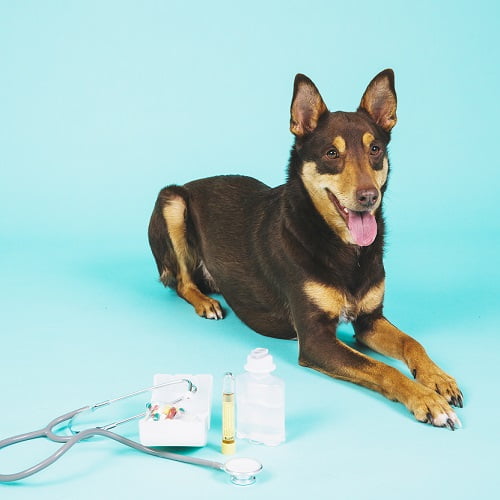Introduction about When to Give Liver Tonic to Dogs
Liver tonics for dogs contain healthy supplements that support canine liver health. Liver illness is dangerous and can even be deadly if left unchecked. Knowing when to give your dog a liver tonic could help protect its long-term health. This in-depth guide covers all you need to know. Especially about utilizing liver tonics as part of your dog’s care.
What is a liver tonic?
Liver tonic is an oral nutritional product meant to feed, strengthen, and protect your dog’s liver. It includes a mix of vitamins, minerals, enzymes, and plant ingredients. Especially for improving liver function and recovering energy in dogs.
The liver performs over 300 crucial processes in your dog’s body. It processes foods, filters toxins, controls cholesterol, and stores energy. It makes proteins that are crucial for blood clotting and digestion. When the liver is not working properly, it can damage your dog’s whole body. A liver tonic can help keep the liver in peak shape so it can carry out all its unique roles.
Liver tonic comes in liquid or powder forms. That is mixed into your dog’s food or water. It offers tailored nutritional support so the liver stays healthy even when stressed.
Key Ingredients in Liver Tonic for Dogs
Liver tonics feature a mix of vitamins, minerals, and antioxidants. That help strengthens, protect, and restore your dog’s hard-working liver. Key components usually include:

- Vitamin B complex supports enzyme processes.
- Vitamin C is a potent antioxidant.
- Vitamin E improves blood flow.
- Selenium protects liver cells.
- Zinc aids in liver cell renewal.
- Milk thistle detoxifies the liver.
- Turmeric reduces inflammation and fights cell damage.
- Beetroot cleanses the blood and stomach.
- Dandelion stimulates bile formation.
Benefits of Liver Tonic for Dogs
There are many possible benefits. That supplements your dog’s food with liver juice daily or as needed. Some are as below.
- Detoxification of the blood and liver
- Regeneration of the broken liver cells
- Boosts bile production
- It improves liver enzyme levels and protects the liver from toxins.
- Reduces liver inflammation strengthens the immune system and increases energy and vitality.
- By improving the health of the dog’s liver. A liver tonic can have positive benefits throughout the whole body.
When is Liver Tonic Recommended for Dogs?
There are certain cases where giving your dog liver tonic is especially recommended. It helps to support liver function and health.
1. General Health Maintenance
Using liver boosters daily is crucial for all dogs. It helps to support this useful system and keep it running properly. Added liver support helps counteract the effects of natural toxins and impurities. That your dog meets in food, drink, and the general surroundings.
2. Senior Dogs
A liver tonic is helpful for older dogs. Whose liver function tends to decline with age. Because senior dogs’ livers have lower vitamins, blood flow, and cleansing abilities. The liver tonic restores crucial nutrients to keep the liver strong.
3. Diagnosis of Liver Disease
If your dog is diagnosed with a liver condition. Like hepatitis, cirrhosis, fatty liver disease, liver cancer, or liver failure. A liver tonic helps strengthen the liver. It slows the development of the disease. Your vet may directly suggest a liver tonic.
4. Certain Breeds
Some breeds are naturally prone to certain inherited liver diseases. These include Doberman Pinschers, Labrador Retrievers, and Cocker Spaniels. It also includes West Highland White Terriers, Skye Terriers, and Bedlington Terriers. Overall, liver tonic helps their liver’s health.
5. Dogs on Medications
Medications metabolize in the liver. It includes anti-inflammatory drugs, anticonvulsants, cancer drugs, antibiotics, and opioids. The toxins from such items can harm the liver. Liver tonic counteracts the side effects.
6. Exposure to Toxins
If your dog accidentally ingests toxin-containing foods, chemicals, plants, drugs, or vitamins. The liver has to process them. Thus, Liver tonic can reduce and clear the chemicals faster to avoid ongoing damage.
7. Recovery from Disease
A dog recovering from a liver infection. Like leptospirosis or an inflammatory condition like pancreatitis. That stressed its liver, an ongoing liver tonic aids full recovery.
8. Before/After Surgery
A liver tonic helps prepare your dog’s liver for the drug and anesthetic demands of surgery. It also speeds up the healing of liver function afterward.
How to Give Your Dog Liver Tonic
Liver tonics come in powder or liquid forms that can be mixed into your dog’s food. Stir the supplement into your dog’s food or water as label instructions for proper dosing. That is according to your dog’s size and needs.
Make sure your dog takes all the extra food or water. So it gets the full dose. Give the liver tonic with a meal for the best absorption.
If your dog has health problems or is very picky. Check with your vet about the best way to ensure. That your dog gets the liver tonic he needs. Your vet may suggest heavy supplements for a period to treat liver disease.
Signs Your Dog Might Need Liver Tonic
Some signs your dog may benefit from liver medicine include:
- Loss of appetite
- Weight loss
- Vomiting
- Diarrhea
- Increased thirst/urination
- Lethargy
- Jaundice
- Swollen belly
- Bleeding disorders
- Behavior changes
These can show your dog’s liver health needs help. But only medical tests can tell if the cause is liver-related. Proper medical care is crucial.
Safety Tips When Giving Liver Tonic
Under your vet’s direction, liver tonics are very safe for dogs. Here are some additional tips for safe use:
- Give the amount recommended on the product package or by your doctor. Do not overdo it.
- Store in a cool, dry place away from direct light.
- Check the product release date; do not use it if it is outdated.
- Use a fresh, clean dish to mix and serve.
- Mix it into the food just before serving. Do not pre-mix.
- Watch for signs of resistance, like vomiting or diarrhea.
- For drinkable tonics, use only the dropper given with the bottle.
- Keep the medicine out of reach of children and other pets.
Things to Avoid
There are also some measures to keep in mind when giving your dog liver tonic:
- Do not give if your dog has a liver shunt without medical approval.
- Avoid using drugs handled by the liver. Before visiting your doctor to prevent reactions.
- Do not give a drink containing iron to dogs with iron overload illness.
- Do not overdo the recommended dose; more is not better.
- Do not give tonics made for other species, like horses.
- Do not use tonics past their expiry date. Or that looks or smells odd.
- With prudence and medical direction, Liver tonics can be added to your dog’s care plan without a hitch.
Signs of Liver Tonic Overdose for Dog
In the rare case, if the dog is given an extra amount of liver tonic. It can cause iron overload or vitamin A poisoning based on specific ingredients.
Possible signs of liver medicine excess include:
- Loss of coordination
- Head tilt
- Rapid breathing
- Fever
- Diarrhea, seizures, and coma
Seek quick medical care if an overdose is feared. Having the bottle on hand helps with spot treatment.
Alternative Options to Liver Tonic for Dogs
Instead of commercial liver tonic. Some owners decide to support their dog’s liver health using:

1. Milk thistle juice
This plant has antioxidant benefits that help protect liver cells from toxins.
2. SAMe (S-Adenosyl-Methionine)
This molecule helps liver cell renewal and the production of glutathione protectors.
3. Diet change
Some veterinary experts suggest liver-cleaning dog foods.
4. Phosphatidylcholine
This vitamin helps liver repair and cell membrane development.
Discuss different liver support choices with your vet to find the best fit for your dog.
The Bottom Line on Liver Tonics for Dogs
Liver juice offers specific nutritional support to feed your dog’s liver. The ingredients in liver juice also help fix the harm. It lowers swelling and protects liver cells from toxins and waste. Using liver tonic regularly. Or as suggested by your vet can improve your dog’s liver health. Especially during times of higher demand. Like aging, drug use, chemical exposure, or disease healing.
Conclusion about When to Give Liver Tonic to Dogs
Liver tonics are very safe when used as advised. Although some precautions apply. Look for changes like lower hunger, fatigue, sickness, or diarrhea. That could suggest resistance. Partner with your trusted vet to determine the idea of using tonics. Or if your precious dog could benefit from adding this tonic into their care routine. With liver tonic and careful care. Your dog’s liver can continue carrying out its 300+ important tasks for years to come.

FAQs about When to Give Liver Tonic to Dogs
Here is the list of the most searched questions.
Q1: What is the point of liver tonic for dogs?
A liver tonic is a product with vitamins, minerals, and herbs meant to help support liver health. It also supports performance in dogs. The ingredients help protect liver cells, lower inflammation, improve blood flow, and more.
Q2: When should I give my dog liver tonic?
Good times to give your dog liver tonic for health is crucial. It includes older dogs, dogs with liver disease, and dogs taking medicines. It also includes dogs exposed to chemicals, and before/after surgery.
Q3: What precisely is a liver tonic and how can it help my dog?
Liver tonic is a nutritional product carefully made to support your dog’s liver health. The vitamins, minerals, and herbs in liver tonic help to strengthen the body. They fix, and protect your dog’s hard-working liver.
Q4: Is it okay for my dog to have liver tonic every day?
It is usually safe to give liver tonic daily. Especially if your vet suggests it for therapeutic uses like liver disease healing. For general health, it’s often given 2-3 times per week. Follow your vet’s dose advice.
Q5: How long should I give my dog liver tonic?
For ongoing health, you can give liver tonics long-term with occasional breaks. For therapy uses, dogs often take it for 3-6 months. Or however long your vet recommends based on lab work and your dog’s reaction.
Q6: Should I give my dog liver tonic with food or on an empty tummy?
It’s best to mix the liver tonic powder or liquid into your dog’s meal rather than giving it on an empty stomach. That way the nutrients can be properly taken by the body.
Q7: What signs might mean my dog needs liver support?
Possible signs include fatigue, sickness, diarrhea, weight loss, and increased thirst/urination. It also includes a red tint to eyes/gums, swollen belly, blood disorders, and behavior changes. Testing is needed to identify liver problems.
Q8: Can I whip up a homemade liver tonic for my dog?
Homemade choices like milk thistle tea or dandelion tea can provide some liver help. But they can not replace a full commercial liver tonic suggested by your Vet. Talk to your vet before changing your dog’s food.
Q9: Are there any risks or side effects of liver medicine I should know about?
Liver tonics are very safe when used as recommended. Possible side effects like vomiting or diarrhea show sensitivity. Too much iron can happen if a whole bottle is eaten. Always stick to suggested doses.
Q10: What should be in a good liver medicine for dogs?
High-quality liver tonics contain helpful ingredients. Like vitamins B, C, E, milk thistle, ginger, and dandelion. It also includes selenium, zinc, beets, and other nutrients that support the liver.
Q11: How much liver tonic should I give my dog?
The dose depends on the product directions and your dog’s weight and needs. Follow label instructions or your vet’s recommended dosage. Do not exceed the suggested amount.
For more details about the articles: Click Here













I truly appreciated the work you’ve put forth here. The sketch is tasteful, your authored material stylish, yet you appear to have developed some nervousness regarding what you intend to deliver next. Rest assured, I’ll return more regularly, much like I’ve done almost constantly, should you maintain this upward trajectory.
I truly relished the effort you’ve invested here. The design is tasteful, your authored material fashionable, however, you seem to have acquired some unease about what you intend to present henceforth. Undoubtedly, I’ll revisit more regularly, similar to I have nearly all the time, in the event you sustain this rise.
I’ve been visiting this site for years, and it never fails to impress me with its fresh perspectives and wealth of knowledge. The attention to detail and commitment to quality is evident. This is a true asset for anyone seeking to learn and grow.
Thank you for your response! I’m grateful for your willingness to engage in discussions. If there’s anything specific you’d like to explore or if you have any questions, please feel free to share them. Whether it’s about emerging trends in technology, recent breakthroughs in science, intriguing literary analyses, or any other topic, I’m here to assist you. Just let me know how I can be of help, and I’ll do my best to provide valuable insights and information!